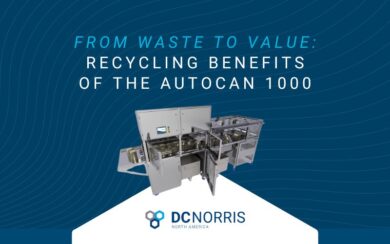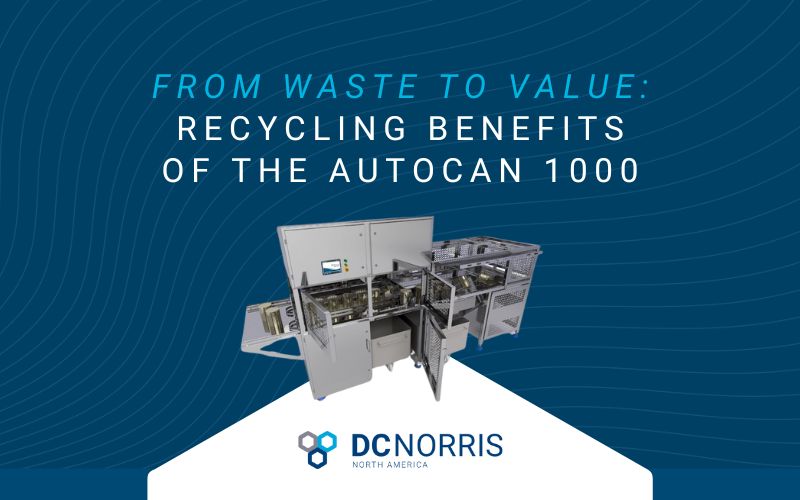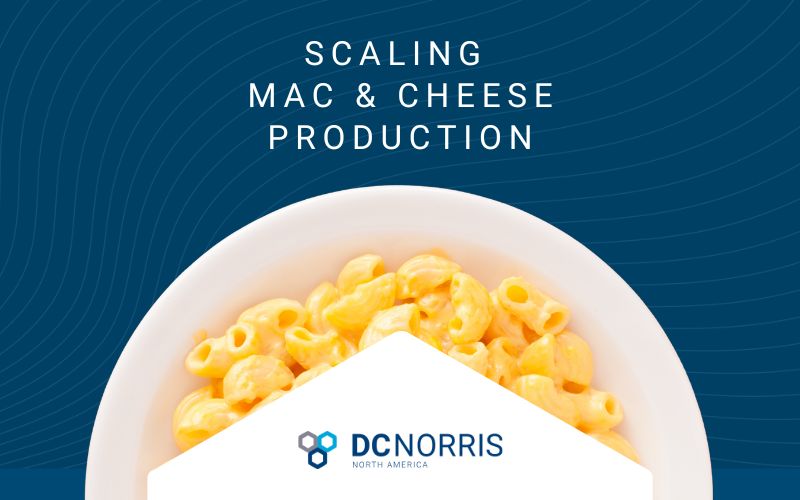
In this article:
- The Problem with Traditional Can Disposal
- The AutoCan 1000 Solution
- How the AutoCan 1000 Delivers Environmental & Operational Impact
- Frequently Asked Questions About the AutoCan 1000
- See the AutoCan 1000 in Action
Efficiency in high-volume food manufacturing doesn’t stop at processing. It extends all the way to waste management. The DC Norris AutoCan 1000, a fully automated can processing system, is designed to streamline operations and deliver real value in how processors handle their can waste.
The Problem with Traditional Can Disposal
Food processors handling thousands of cans a day face a significant waste challenge. Standard disposal practices often involve dumping unrinsed, bulky cans into waste bins, which makes it difficult for businesses to meet recycling requirements set by material recovery facilities (MRFs). These facilities typically reject or downgrade cans contaminated with food residue, leading to increased landfill volume, lost recycling value, and added costs, not to mention the space that this amount of empty cans requires.
With more facilities pursuing sustainability targets and striving to minimize waste, the need for a better approach was clear. DC Norris designed the AutoCan 1000 to meet the need, and DC Norris North America is proud to be the exclusive AutoCan 1000 provider for producers in the US and Canada.
The AutoCan 1000 Solution
The AutoCan 1000 addresses can processing challenges for manufacturers, prioritizing recycling empty A10 cans to minimize environmental impact and recover valuable materials. Following the pre-rinse and blowoff stage, the AutoCan 1000 then opens and empties the cans, rinses them to remove residual product, and then crushes the cans, reducing their volume by up to 80%.
Key features include:
- All stainless steel construction.
- HMI touchscreen operation.
- Pneumatic cylinders for accurate positioning and opening.
- Gravity-fed product discharge.
- Available vibratory attachment.
- Available sterile air purges.
The AutoCan 1000 Delivers Environmental & Operational Impact
By combining five critical can processing steps into one system, the AutoCan 1000 automates a significant amount of manual labor and dramatically improves recycling credentials. The benefits:
- Lower waste handling costs: Minimized can volume can mean fewer pickups and lower MRF fees
- Higher recycling rates: Clean, crushed cans are most likely to be recycled and often more valuable
- Improved compliance: Meet internal sustainability and corporate environmental, social, and governance (ESG) goals
Frequently Asked Questions About the AutoCan 1000
- How many cans per hour can the AutoCan 1000 handle? The AutoCan 1000 is designed for high-throughput environments and can process up to 1,000 A10 cans per hour, making it ideal for large-scale operations.
- What size cans does it accommodate? It is optimized for A10 cans, which are widely used in food manufacturing, but additional changeover sets for other can sizes are available.
- Does the rinse feature use a lot of water? The rinse system is designed to be efficient and targeted, using only the amount of water necessary to meet sanitation requirements.
- How does it improve recycling rates? By removing food residue and crushing cans into a consistent, compact form, the AutoCan 1000 produces a material that MRFs are more likely to accept and process effectively.
- Can it integrate with existing lines? Yes. The AutoCan 1000 features a modular design with conveyor feed allowing seamless integration into most existing processing environments.
- Is the AutoCan 1000 available in North America? Yes. DC Norris North America is the exclusive provider of the AutoCan 1000 for US and Canadian food processors and manufacturers.
The AutoCan 1000 Can Turn Waste Management Into a Value-Generating Advantage
Waste doesn’t have to be exclusively a cost center. With the AutoCan 1000, food processors and manufacturers can turn waste management into a value-generating process. Contact our team to learn more.
See the AutoCan 1000 in Action:



